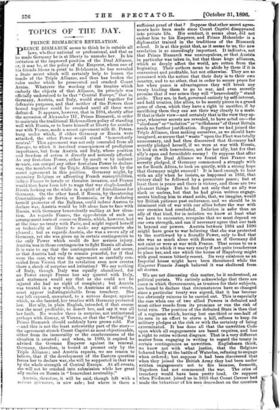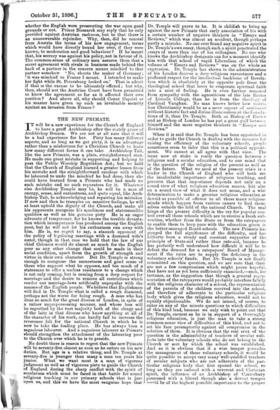TOPICS OF THE DAY.
PRINCE BISMARCK'S REVELATION.
PRINCE BISMARCK seems to think he is outside all laws, whether national or professional, and that as he made Germany he is at liberty to unmake her. In his irritation at the improved position of the Dual Alliance, or, it may be, at the policy of the Emperor, whom one of his friends likens in print to Belshazzar, he has revealed a State secret which will certainly help to loosen the bonds of the Triple Alliance, and thus has broken the rules under which he prosecuted and crushed Count Arnim. Whatever the wording of the treaties which embody the objects of that Alliance, its principle was officially understood to be that " Central Europe," that is, Germany, Austria, and Italy, would stand together for defensive purposes, and that neither of the Powers thus bound together could be crushed until all three were defeated. It appears, however, that in 1884, shortly after the accession of Alexander III., Prince Bismarck, in order to maintain the traditional Hohenzollern policy of standing well with Russia, or to leave himself at liberty for another war with France, made a secret agreement with St. Peters- burg under which, if either Germany or Russia were attacked, the abet Power would stand " benevolently neutral." This agreement was not only concealed from all Europe, to which it involved consequences of prodigious importance, but from Austria and Italy, whose position and freedom of action it directly and seriously affected. As any first-class Power, either by insult qr by indirect menace, can compel any other first-class Power to declare war, the members of the Triple Alliance were left by the secret agreement in this position. Germany might, by menacing Belgium or affronting French susceptibilities, induce France to invade or threaten invasion, and France would then have been left. to wage that war single-handed Russia looking on the while in a spirit of friendliness for Germany. On the other hand, if Russia, by threatening Constantinople or Servia or Roumania, or by declaring herself protector of the Balkans, could induce Austria to declare war, Austria would be left. alone face to face with Russia, with Germany benevolently smiling at her situa- tion. As regards France, the opprobrium of such an arrangement rests of zourse on Russia, which, however, had at the time no treaty with Paris, and might regard herself as technically at liberty to make any agreements she pleased ; but as regards Austria, she was a sworn ally of Germany, yet she was given up in certain contingencies to the only Power which could do her serious injury. Austria was in those contingencies to fight Russia all alone. It is vain to say that the contingencies could not occur, or that Austria had only to remain peaceful, for if that were the case, why was the agreement so carefully con- cealed from Vienna that its revelation even now creates there a shock of surprise and irritation? We say nothing of Italy, though Italy was equally abandoned, for no Power except France has any quarrel with Italy, and statesmen would say that as she could not be injured she had no right of complaint ; but Austria was treated in a way which, to Austrians at all events, must appear indistinguishable from treachery. She was left exposed, unwarned, to a serious danger, against which, as she fancied, her treaties with Germany protected her. Her ally, in plain English, intended, if that course was the most profitable, to desert her, and say it was all her fault. No wonder there is surprise, not untinctured perhaps with dismay, at Vienna, or that the "feeling" for Prince Bismarck should suddenly have grown cold. For —and this is not the least noteworthy part of the story— the agreement struck Count Caprivi as most objectionable, either from its immorality or the cumbrousness of the situation it created ; and when, in 1890, it expired he advised the German Emperor against its renewal. Germany, therefore, is bound at present only by the Triple Alliance ; and Austria expects, we see reason to believe, that if the development of the Eastern question forces her to declare war, she will be supported in that war by the whole strength of Central Europe. At all events, she will not be crushed into submission while her great ally smiles on Russia in "benevolent neutrality."
Austria, therefore, it will be said, though left with a serious grievance, is now safe ; but where is there a sufficient proof of that P Suppose that other secret agree. ments have been made since Count Caprivi disappeared into private life. His conduct, it seems clear, did not endear him to his Emperor, and Prince Hohenlohe is a diplomatist trained in the traditions of the Bismarck school. It is at this point that, as it seems to us, the new revelation is so exceedingly important. It indicates, not that Prince Bismarck was unscrupulous, or that Austria in particular was taken in, but that these huge alliances, which so deeply affect the world, are rotten from the beginning. Their authors mean to abide by them if it is convenient and profitable, but not otherwise. They are so possessed with the notion that their duty is to their own country, and to no other, that in order to secure peace for her when peace is advantageous they will break any treaty binding them to go to war, and even secretly promise that if war arises they will " benevolently " stand aside. They are, in fact, governed entirely by self-interest, and hold treaties, like allies, to be merely pieces in a grand game of chess, which they have a right to sacrifice, if by sacrificing them they can see their way clearly to a mate. If that is their view—and certainly that is the view they ap- pear, whenever secrets are revealed, to have acted on—the "aloofness" or "isolation" or "selfishness" of Great Britain needs no further justification. Suppose we had joined the Triple Alliance, thus making ourselves, as we should have imagined, so secure that " waste "upon the Fleet was totally unnecessary, and had then discovered that Germany had secretly pledged herself, if we were at war with Russia, to look on with benevolence, not for her ally, but for that ally's open and formidable enemy ! Or suppose that after joining the Dual Alliance we found that France was secretly pledged, if Germany commenced a struggle with for South Africa, to look on quietly, with a strong hope that Germany might succeed ! It is hard enough to bear with an ally when he insists, as happened In 1856, that victory shall be followed by a premature peace ; but at least there is peace and there is victory, and those are two pleasant things But to find not only that an ally was slack or useless, but that he had given written engage- ments binding him to stand aside, that, we imagine, would try British patience past endurance, and we should be in imminent risk of war with our allies before the war with our enemies had concluded. Isolation is safer than an ally of that kind, for in isolation we know at least what we have to encounter, recognise that we must depend on our own strength, and can if necessary agree that our task is beyond our powers. Austria between 1884 and 1890. might have gone to war believing that she was protected to the northward by a friendly Power, only to find that she was as much alone with Russia as if Germany did not exist or were at war with France. That seems to us a position in which it was very nearly if not quite treacherous to place her, and one which the house of Hapsburg might with good reason bitterly resent. Its very existence as an Imperial house might have been threatened while the Emperor Francis Joseph believed it was sheltered from all storms, We are not discussing this matter, be it understood, as political purists. We entirely acknowledge that there are cases in which Governments, as trustees for their subjects, are bound to declare that circumstances have so changed since a particular treaty was signed, that it has become too obviously ruinous to be carried out. This is especially the case when one of two allied Powers is defeated and must either recede from its promises or run the risk of total ruin. The position of the defeated State is then that of a regiment which, having lost one-third or one-half of its men in an effort to storm a hill, refuses to keep its military pledges at the risk or with the certainty of being exterminated. It has done all that the unwritten Code upon which all engagements are based requires, and has a right to retire without disgrace. That is a very different matter from engaging in writing to regard the treaty in certain contingencies as unwritten. Englishmen think, we know not with what justice, that the Belgians behaved badly at the battle of Waterloo, refusing to engage when ordered ; but suppose it had been discovered that when they joined the British Army they had been under written engagements not to fire because, forsooth, Napoleon had not commenced the war. The cries of treachery would have been pretty loud. Or suppose when Piedmont joined us in 1855 that Count Cavour had made the behaviour of his men dependent on the question whether the English were prosecuting the war upon good grounds or not. Prince Bismarck may reply that he only provided against Austrian rashness, but to that there is an unanswerable rejoinder. Why, then, did he conceal from Austria the terms of his new engagement, terms which would have directly bound her over, if they were known, to moderation and good behaviour ? If he meant that, his secrecy was against his policy, not in favour of it. The common-sense of ordinary men assures them that a secret agreement with rivals in business made behind the back of a partner in the concern means mischief to that partner somehow. 'No,' shouts the maker of Germany ; it was mischief to France I meant. I intended to make her fight while St. Petersburg looked on.' That is adroit if that is the excuse to be ultimately offered ; but why, then, should not the Austrian Court have been permitted to know the agreement so far as it affected their own position ? And. above all, why should Count Caprivi or his master have given up such an invaluable security against an invasion from France ?











































 Previous page
Previous page